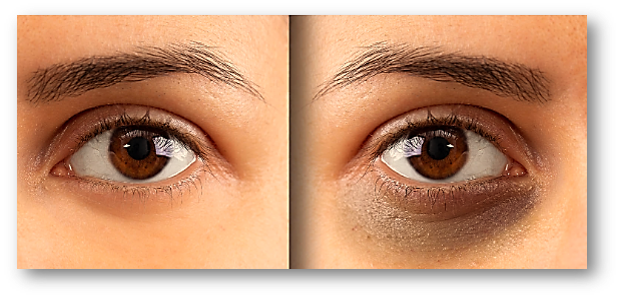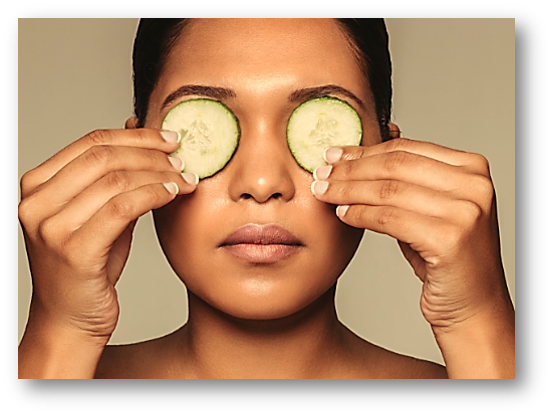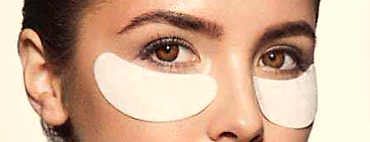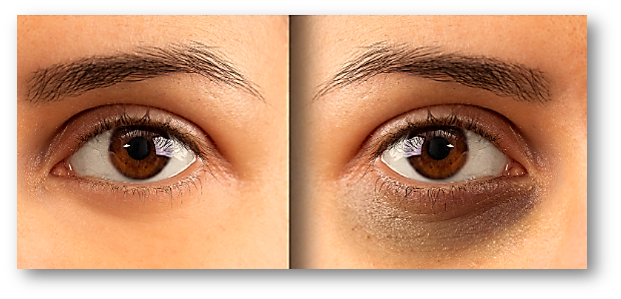DARK CIRCLE!!
Dark circle under the eyes can be caused by a variety of factors, including genetics, aging, allergies, eczema, and sinus problems. Lack of sleep, stress, and dehydration can also contribute to the appearance of dark circles. Some people may also have naturally darker skin around their eyes, which can make circles appear more prominent. In most cases, dark circles can be treated with a combination of home remedies and over-the-counter products. Some popular remedies include using cold compresses, getting more sleep, and applying creams that contain vitamin K and/or retinol. If you are concerned about dark circles, it is best to consult with a dermatologist to determine the underlying cause and to discuss the best treatment options.

WHAT DEFICIENCIES CAUSE DARK CIRCLES??
Dark circles under the eyes can be caused by a variety of factors, including genetics, aging, allergies, eczema, and sinus problems. Lack of sleep, stress, and dehydration can also contribute to the appearance of dark circles. In some cases, dark circles may be a symptom of a deficiency in certain nutrients, such as iron, vitamin K and vitamin B12.
Iron deficiency, which can lead to anemia, can cause dark circles because of the decrease in hemoglobin in the body. Hemoglobin is a protein in red blood cells that carries oxygen throughout the body. When the body does not have enough iron, it cannot produce enough hemoglobin, which can lead to a lack of oxygen in the skin.
Vitamin K is important for blood clotting and also helps in the healing process. A deficiency of vitamin K can lead to easy bruising and dark circles.
Vitamin B12 is important for the production of red blood cells, which carry oxygen to all parts of the body. A deficiency in vitamin B12 can lead to anemia, which can cause dark circles.
It’s important to note that dark circles can have multiple causes and a deficiency in any of these vitamins may or may not be the sole cause. Therefore, If you are concerned about dark circles, it is best to consult with a doctor or a dietitian to determine the underlying cause and to discuss the best treatment options.
ARE DARK CIRCLES PERMANENT??
Dark circles under the eyes can be a temporary or a permanent issue. In some cases, dark circles may be caused by temporary factors such as lack of sleep, stress, or allergies, and can be improved with lifestyle changes and home remedies.
However, in other cases, dark circles may be caused by genetic or structural factors, such as deep-set eyes or thinning of the skin with age, and maybe more difficult to improve.
Additionally, dark circles may be caused by certain medical conditions or nutritional deficiencies. In these cases, treating the underlying condition may help to improve the appearance of dark circles.
It’s important to note that there is no one-size-fits-all solution for dark circles and that different treatments may work for different people. It’s best to consult with a dermatologist to determine the underlying cause of your dark circles and to discuss the best treatment options.
DIETRY COMPONENT ARE RICH IN VITAMEN B12 AND VITAMEN K!
Vitamin B12 and Vitamin K are essential nutrients that can be found in a variety of foods.
Vitamin B12 is found primarily in animal-derived foods, such as meat, fish, eggs, dairy products, and fortified cereals. Some plant-based sources of vitamin B12 include fortified nutritional yeast, tempeh, and some types of seaweed.
Vitamin K is found in a wide variety of fruits and vegetables, with the highest concentrations found in leafy green vegetables such as spinach, kale, and collard greens. Other good dietary sources of vitamin K include broccoli, Brussels sprouts, and other cruciferous vegetables, as well as avocado, kiwi, and kiwi fruit.
Meat, eggs, and dairy are also good sources of vitamin K.
It’s important to note that these are not the only sources of these vitamins and that a balanced diet is important. It’s best to consult with a doctor or a dietitian to determine if you are getting enough of these vitamins in your diet.
FRUIT AND VEGETABLE ARE BEST FOR DARK CIRCLES!!

There is no specific fruit or vegetable that is known to be the best for treating dark circles under the eyes. However, certain fruits and vegetables are high in nutrients that are important for maintaining the health of the skin and may be beneficial for reducing the appearance of dark circles. Some examples include:
Leafy green vegetables:
Spinach, kale, collard greens, and other leafy greens are high in vitamin K, which helps to improve blood clotting and may help to reduce the appearance of dark circles.
Citrus fruits:
Oranges, lemons, and limes are high in vitamin C, which is an antioxidant that helps to protect the skin from damage.
Berries:
Strawberries, blueberries, and raspberries are high in antioxidants and may help to reduce inflammation and protect the skin from damage.
Tomatoes:
Tomatoes are high in lycopene, an antioxidant that helps to protect the skin from sun damage, which may be beneficial for reducing the appearance of dark circles.
Cucumbers:
Cucumbers have high water content and may help to hydrate the skin and reduce puffiness around the eyes.
It’s important to note that a balanced diet with a variety of fruits and vegetables is important. In addition, as previously mentioned, dark circles can have multiple causes and a deficiency in any of these vitamins may or may not be the sole cause. Therefore, If you are concerned about dark circles, it is best to consult with a dermatologist to determine the underlying cause and to discuss the best treatment options.
CAUSES OF DARK UNDER EYES/DARK CIRCLES!!
Dark circles under the eyes can have a variety of causes, including:
Genetics:
Some people may be more prone to dark circles due to their genetic makeup.
Aging:
As we age, the skin around the eyes becomes thinner, making the blood vessels more visible. This can lead to dark circles.
Allergies:
Allergic reactions can cause inflammation and swell in the nasal passages, which can lead to dark circles.
Eczema:
This skin condition can cause inflammation and itching around the eyes, leading to dark circles.
Sinus problems:
Sinus infections or congestion can cause dark circles by causing blood vessels in the area to dilate.
Lack of sleep: When you don’t get enough sleep, the skin around your eyes can appear pale, making dark circles more noticeable.
Stress:
Stress can cause blood vessels to dilate and can also lead to a lack of sleep, both of which can contribute to dark circles.
Dehydration:
When the body is dehydrated, the skin can appear dull and the eyes sunken, which can make dark circles more prominent.
Nutritional deficiencies:
Dark circles may also be a symptom of a deficiency in certain nutrients such as iron, vitamin K, and vitamin B12.
It’s important to note that dark circles can have multiple causes and that different treatments may work for different people. It’s best to consult with a dermatologist to determine the underlying cause of your dark circles and to discuss the best treatment options.
HOW CAN YOU REDUCE DARK CIRCLES NATURALLY??

There are several natural ways to reduce the appearance of dark circles under the eyes, including:
Getting enough sleep:
Aim for 7-9 hours of sleep per night.
Reducing stress:
Try stress-reducing techniques such as meditation, yoga, or deep breathing exercises.
Drinking enough water:
Staying hydrated can help to plump up the skin and reduce the appearance of dark circles.
Applying cold compresses:
Applying a cold compress to the eyes can help to constrict blood vessels and reduce puffiness.
Using a humidifier:
Dry air can exacerbate dark circles, so using a humidifier can help to keep the skin moisturized.
Eating a healthy diet:
Eating a diet rich in fruits, vegetables, and lean protein can help to provide the body with the nutrients it needs to maintain healthy skin.
Applying natural remedies:
Some people may find that using natural remedies such as coconut oil, aloe vera, or cucumber slices can help to reduce the appearance of dark circles.
Using vitamin-rich creams:
Vitamin K and Vitamin C are known to be beneficial for the skin. So look for creams that contain these vitamins.
It’s important to note that these remedies are not scientifically proven to be effective and may not work for everyone. It’s best to consult with a dermatologist to determine the underlying cause of your dark circles and to discuss the best treatment options.
KEYWORDS: Dark circle, Dark circle, Dark circle, Dark circle

